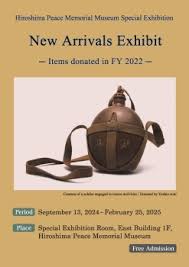Willkommen auf der Seite der "Textinitiative Fukushima"
Die Seiten der Textinitiative Fukushima werden derzeit von der Japanologie der Goethe-Universität betrieben. Gegenwärtiges Anliegen von TIF ist die zeitgeschichtliche Dokumentation. Das Forum dient nun in erster Linie als Archiv für Informationen zu 3/11 sowie allgemein zur Geschichte des Atomaren. Die Suchfunktion ermöglicht Recherchen zu Stichworten, Inhalten und Akteuren.
| Ausstellung Friedensmuseum | Hiroshima Peace Memorial Museum Special Exhibition 2024 | 21.10.2024 |
"Every year, survivors of the atomic bombing (hibakusha) or bereaved family members donate to the Hiroshima Peace Memorial Museum materials related to the bombing. These materials bring to life people and neighborhoods that existed around the time of the atomic bombing." Links: https://hpmmuseum.jp/modules/event/index.php?action=PageView&page_id=59&lang=eng https://hpmmuseum.jp/modules/xelfinder/index.php/view/2879/Flyer_E.pdf
|
|
| Friedensnobelpreis für japanische Anti-Atomwaffenorganisation | 18.10.2024 |
"Die japanische Friedensorganisation Nihon Hidankyo wird in diesem Jahr mit dem Friedensnobelpreis ausgezeichnet. Die Organisation wird damit für ihren Einsatz für eine Welt frei von Atomwaffen geehrt und auch dafür, dass sie durch Zeitzeugen-Aussagen demonstriert hat, dass solche Waffen nie wieder eingesetzt werden sollten." (BR, 11.Oktober 2024) Links: https://www.br.de/nachrichten/deutschland-welt/friedensnobelpreis-fuer-japanische-anti-atomwaffenorganisation,UQrsh5k |
|
| Historischer Hintergrund: Die Nuklearkatastrophe von Tschernobyl: Bundesstiftung Aufarbeitung | 07.10.2024 |
Zur Stiftung: "Die Bundesstiftung zur Aufarbeitung der SED-Diktatur befördert die Aufarbeitung der Ursachen, Geschichte und Folgen der Diktatur in SBZ und DDR und begleitet den Prozess der Deutschen Einheit." Links:: https://www.bundesstiftung-aufarbeitung.de/de/recherche/dossiers/tschernobyl/nuklearkatastrophe |
|
| Stichwort Nuklearterrorismus | 04.09.2024 |
Japans Engagement zur Bekämpfung von Nuklearterrorismus "Die Regierung von Japan beabsichtigt, ihr Engagement zur Bekämpfung von Nuklearterrorismus auszuweiten, indem sie den Fokus auf große öffentliche Events legt wie die Zusammenarbeit meines Landes mit der IAEA bei den Olympischen und Paralympischen Spielen 2020 in Tokyo. Auch die Reaktion auf neu auftretende Bedrohungen der nuklearen Sicherheit wie z.B. Cyberangriffe bildet eine wichtige Herausforderung zur Stärkung der internationalen Nichtverbreitung. Jeder Staat, der Verantwortung für die nukleare Sicherheit in seinem Innern trägt, sollte seine eigenen Kapazitäten kontinuierlich ausbauen, indem er angemessene einheimische Systeme entwickelt." (Die Botschaft von Japan, Juli 2017, Grußwort von Staatsminister Sonoura Kentarō) Links: https://www.de.emb-japan.go.jp/NaJ/NaJ1707/post_sicherheitspolitik.html (2017)
|
|
| Renaissance der Atomkraft in der Schweiz? | 29.08.2024 |
"28. August 2024: Der Bundesrat rüttelt am 2017 beschlossenen Verbot des Baus neuer Atomkraftwerke. Er kündigt an, eine entsprechende Vorlage zu erarbeiten." (SRF 28. August 2024) Links: |
|
|
1-5 von 723
|

 "Der radioaktive Niederschlag, der sich nach der Explosion über die Atmosphäre verbreitete, hat weite Gebiete vergiftet. Etwa 6.400 km² Agrarfläche mussten in der Region von Tschernobyl aufgrund der hohen Strahlenbelastung aufgegeben werden. Die wirtschaftlichen Folgen des Unglücks für die Sowjetunion waren immens – nicht zuletzt aufgrund des enormen Prestigeverlusts, der mit der Katastrophe verbunden war. Die finanziellen Kosten, der Verlust des politischen Renommees und die wirtschaftlichen Schäden werden daher mitverantwortlich gemacht für den Zusammenbruch der Weltmacht Anfang der 1990er-Jahre. Der sowjetische Staats- und Parteichef Michail Gorbatschow bezeichnete in seinen Memoiren den Atomunfall von Tschernobyl gar als einen „Sargnagel der Sowjetunion“."
"Der radioaktive Niederschlag, der sich nach der Explosion über die Atmosphäre verbreitete, hat weite Gebiete vergiftet. Etwa 6.400 km² Agrarfläche mussten in der Region von Tschernobyl aufgrund der hohen Strahlenbelastung aufgegeben werden. Die wirtschaftlichen Folgen des Unglücks für die Sowjetunion waren immens – nicht zuletzt aufgrund des enormen Prestigeverlusts, der mit der Katastrophe verbunden war. Die finanziellen Kosten, der Verlust des politischen Renommees und die wirtschaftlichen Schäden werden daher mitverantwortlich gemacht für den Zusammenbruch der Weltmacht Anfang der 1990er-Jahre. Der sowjetische Staats- und Parteichef Michail Gorbatschow bezeichnete in seinen Memoiren den Atomunfall von Tschernobyl gar als einen „Sargnagel der Sowjetunion“."